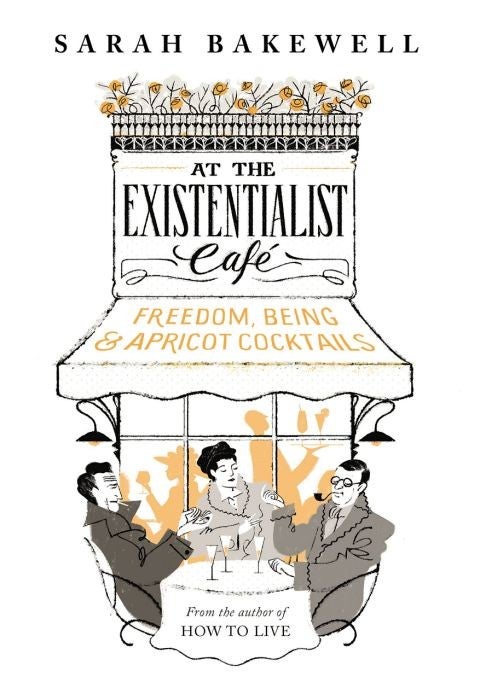She had me at “apricot cocktails”. They sound delicious, don’t they? But the signature drinks only appear at the beginning and briefly at the end of this book.
In the winter of 1932, Bakewell recounts, three young thinkers, Simone de Beauvoir, Jean-Paul Sartre, and Raymond Aron were sitting in a bar in Paris drinking the house cocktail.
Aron had been studying in Berlin and had come under the influence of a new philosophical fashion there. “If you are a phenomenologist,” Aron declared excitedly, “you can talk about this cocktail and make philosophy about it!”
It was the first seed of existentialism. Sartre turned pale and confessed years later: “I can tell you that knocked me out.” He found a guide to the philosophy of Husserl in a nearby bookshop and quickly booked a trip to Berlin. It turns out that existentialism, synonymous with Paris, jazz, black turtlenecks and Gauloises, had a German father after all.
This book, Bakewell suggests, also functions as a sort of café where intellectuals continually pop in and out. Aron is a minor figure, fading away after dropping his bombshell, while de Beauvoir and Sartre remain ensconced at the centre table.
But first we must go to the source: the German phenomenologist Edmund Husserl and his problematic protégé Martin Heidegger, whose modest purpose was, Bakewell calmly states, “to overturn human thinking, destroy the history of metaphysics, and start philosophy all over again”.
Bakewell has a wonderful skill in expressing complex ideas in simple terms. She has read all these difficult texts so we don’t have to, and even communicates a certain amount of intellectual pleasure therein.
Phenomenology is a method rather than a set of theories and “at the risk of wildly oversimplifying – its basic approach can be conveyed through a two-word command: DESCRIBE PHENOMENA”.
It was thus a simple but powerful tool to dismantle all kinds of mental frippery: “distractions, habits, clichés of thought, presumptions and received ideas”, in a cleansing process called epoché.
The result, declares Bakewell in a rousing passage touching on coffee, wine-tasting, and mystical states, “is a great liberation”.
Bakewell examines the way ideas and theories are taken up by others, refined, overturned and discarded in their turn. The great radicals Sartre and De Beauvoir lived long enough to see that this process would also happen to them.
Bakewell’s insight is to see each philosophy not as an austere cerebral process almost divorced from the individual but as intensely lived experience, enmeshed in personality and location. Each of us is our own existentialist café.
Her admiration of Sartre and de Beauvoir appears huge. You will find here no delving into the murkier aspects of their relationship, no attention paid to the imputation of sexual coercion of female students the great feminist supposedly procured for Sartre.
In these pages they may be flawed but they are loveable. “Of course [Sartre] was monstrous. He was self-indulgent, demanding, bad-tempered … a sex addict who didn’t even enjoy sex,” she writes. And yet he “bursts out on all sides with energy, peculiarity, generosity and communicativeness”, the last two qualities definitively not shared by the man who is, in this book at least, his dark twin: the Nazi sympathiser Heidegger.
But there are other habitués at the café, many of them remarkably attractive characters. There’s Boris Vian, writer and jazz trumpeter, who dropped dead of a heart attack at 39 while watching a film version of one of his novels.
Albert Camus drops by, fierce friend of Sartre then even fiercer antagonist; ex-pat American writers Richard Wright and James Baldwin; the blazing Frantz Fanon; Colin Wilson, the English existentialist; and above all, the charming Maurice Merleau-Ponty, philosopher and terrific dancer who was himself to die at only 53.
It’s Merleau-Ponty whom Bakewell hails the true intellectual hero of this book; a thinker who set aside existentialist angst about authenticity to delve into the paradoxes of existence itself.
Along the way Bakewell drops in many delightful and apposite references – to Funny Face, the silly Audrey Hepburn vehicle which lampoons Parisian thinkers and relegates its spirited heroine to marriage with Fred Astaire; to Nicholson Baker’s brilliant phenomenological novel The Mezzanine; to Alex Garland’s film Ex Machina; and to modern concepts of freedom (“freedom” apps, for example) which render phenomenology ever more relevant.
Poisonous political dogma like that of Islamic State certainly calls for the swift and ruthless use of epoché.
“Ideas are interesting, but people are vastly more so,” Bakewell concludes, in defence of her mingling of biography and philosophy. The result is a marvellously erudite hybrid form.
It turns out that coffee and apricot cocktails are so much more mysterious than they appear.
At The Existentialist Cafe: Freedom, Being, And Apricot Cocktails, by Sarah Bakewell. Chatto & Windus £16.99

Join our commenting forum
Join thought-provoking conversations, follow other Independent readers and see their replies
Comments